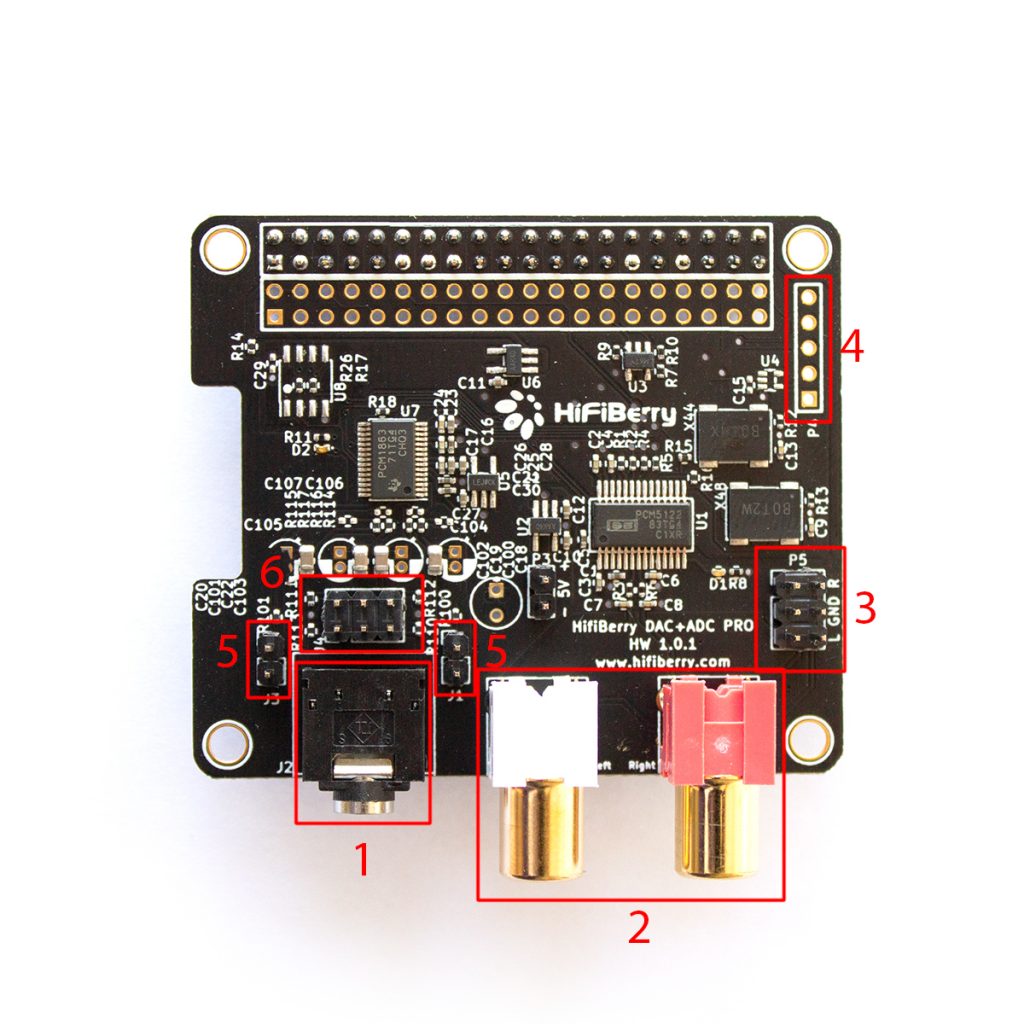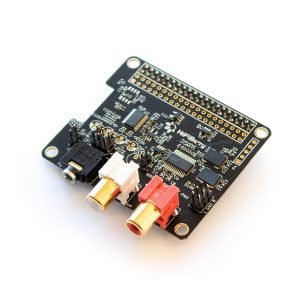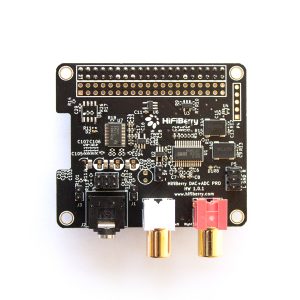
HiFiBerry DAC+ ADC Pro
All prices are VAT included
HiFiBerry DAC+ ADC Pro combines our well-known DAC+ Pro with an analogue input. Both input and output support sample rates up to 192kHz.
Note that you might need to update your Linux kernel to support the audio input features (at least Raspberry Pi kernel 4.19.60)
The HiFiBerry DAC+ ADC Pro is a high-resolution digital-to-analog and analog-to-digital converter for the Raspberry Pi (newer models with 40 pin GPIO connector). This is a special sound card for the Raspberry Pi, optimised for one specific use case: the best audio playback and recording quality. It is specifically designed for applications that do not only need playback, but also recording functionalities.
FACTS
- Stereo input and output
- Dedicated 192kHz/24bit high-quality Burr-Brown DAC
- Dedicated 192kHz/24bit high-quality Burr-Brown ADC
- Hardware volume control for DAC and ADC. You can control the input and output parameters using “alsamixer” or any application that supports ALSA mixer controls.
- Connects directly to the Raspberry Pi, no additional cables needed
- No soldering, comes as a pre-fabricated kit. You just plug it onto the Raspberry Pi, it is conform to the Raspberry Pi hardware-attached-on-top (HAT) specification.
- Compatible with all Raspberry Pi models with a 40-pin GPIO connector
- Directly powered from the Raspberry Pi, no additional power supply
- Three ultra-low-noise linear voltage regulators for optimal audio performance
- Low-jitter dual-domain clock for optimised clock decoupling from the Raspberry Pi
- Mic bias voltage for the use with electret microphones
- No anti-aliasing filter in the input path for best recording bandwidth
- HAT compliant, EEPROM for automatic configuration
- Gold plated RCA output connectors
- Comes with all components required to mount it. We include 4 M2.5x12mm spacers to fix the board onto the Raspberry Pi
- Audio input might require Linux kernel update (at least version 4.19.60)
HARDWARE

Note that the actual board might look a bit different. Layout and components might change without further notice. We do not guarantee a specific PCB layout or specific components.
CONNECTORS AND JUMPERS
| 1 | Analog input |
| 2 | Analoge output |
| 3 | Analog output |
| 4 | I2S data (not for end users) |
| 5 | Microphone bias jumper (you need to close both jumpers to provide a microphone bias voltage) |
| 6 | Analog input |
BALANCED/UN-BALANCED INPUT CONNECTOR J4
This 6-pin connector can be used to connect a balanced input (e.g. XLR or 6.5mm jacks). Pin 1 is on the left bottom corner.
| in R- | 1 | 2 | in R+ |
| GND | 3 | 4 | GND |
| in L+ | 5 | 6 | in L- |
OUTPUT CONNECTOR P5
This connector can be used to connect to external components, e.g. an amplifier. The output is connected in parallel to the RCA jacks. Pin 1 is on the top left.
| +5V | 1 | 2 | R |
| GND | 3 | 4 | GND |
| +5V | 5 | 6 | L |
SPECIFICATIONS
| Maximum input voltage | 2.1Vrms | 4.2Vrms for balanced input |
| Maximum output voltage | 2.1Vrms | |
| ADC signal-to-noise ratio | 110db | typical |
| DAC signal-to-noise ratio | 112db | typical |
| ADC THD+N | -90db | typical |
| DAC THD+N | -93db | typical |
| Frequency response | 10Hz-70kHz | (-3dB) |
| Input gain | -12db to 32dB | |
| Power consumption | <0.3W | |
| Sample rates | 44.1-192kHz |
CONFIGURATION
To support the DAC+ ADC, a Raspberry Pi Linux kernel of at least version 4.19.60 is required. Have a look at the documentation how to update the Linux kernel.
Overlay for config.txt:dtoverlay=hifiberry-dacplusadcpro
If you’re still using an older Linux kernel that does not support the DAC+ ADC, you can still use the output-part of the DAC+ ADC using the HiFiBerry DAC+ driver:dtoverlay=hifiberry-dacplus
MIXER CONTROLS
| Name | Function | Comments |
|---|---|---|
| ADC Left Input | Selects the input for the left channel | For on-board (unbalanced) input use VINL1[SE] for balanced input use {VIN1P, VIN1M}[DIFF] |
| ADC Right Input | Selects the input for the right channel | For on-board (unbalanced) input use VINR1[SE] for balanced input use {VIN2P, VIN2M}[DIFF] |
| ADC Mic Bias | Enables/disables microphone bias voltage | Default: ‘Mic Bias off’, only set to ‘Mic Bias on’ if your microphone requires a bias voltage. |
| ADC | Configures the input gain of the analog input | Use low gains for line-level sources like CD players or similar and high gains for inputs like microphones |
| Digital | Main output volume control | This will control the volume of the analog output |
Example: Configure input for balanced input and maximum input gain (e.g. to connect a dynamic microphone)amixer sset "ADC Mic Bias" "Mic Bias off"
amixer sset "ADC Left Input" "{VIN1P, VIN1M}[DIFF]"
amixer sset "ADC Right Input" "{VIN2P, VIN2M}[DIFF]"
amixer sset ADC 40db
Example: Configure input for onboard input with low gain (e.g. to connect a CD player or similar)amixer sset "ADC Mic Bias" "Mic Bias off"
amixer sset "ADC Left Input" "VINL1[SE]"
amixer sset "ADC Right Input" "VINL1[SE]"
amixer sset ADC 40db
While there are lots of other ALSA mixer control, most of these access internals of the DAC and ADC chips on the board and
should not be changed.


